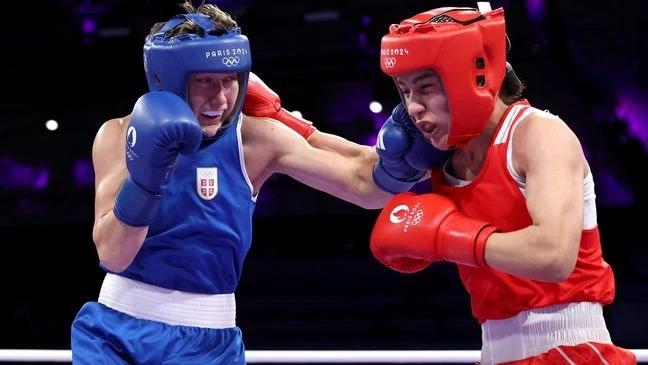In a bold and timely move, the International Olympic Committee (IOC) has officially launched a new initiative titled “IOC Protect Female Category”. Under the leadership of IOC President Kirsty Coventry, this scientific taskforce aims to ensure fairness in women’s sports by reviewing athlete eligibility through a data-driven lens.
This taskforce is designed to review and recommend sport-specific eligibility criteria, particularly focusing on transgender athletes and athletes with Differences in Sex Development (DSD). The goal is to strike the right balance between fair competition and inclusivity.
What Does “Protecting the Female Category” Actually Mean?
The term “protecting the female category” refers to ensuring that women’s sports remain fair by taking into account biological advantages, hormone levels, and performance metrics. Over the past decade, the participation of transgender and DSD athletes has sparked global debate around whether certain athletes may have unfair physical advantages in women’s events.
The IOC has clarified that this is not about exclusion — it’s about defining fairness using scientific data. Coventry stated, “We are committed to a process that is fair, respectful, and grounded in science. Athletes deserve clarity and consistency.”
IOC Protect Female Category: Why It’s Making Headlines
The timing of this announcement is critical. With the Paris 2024 Olympics just around the corner and a historic LA 2028 Games ahead, international sports are under the spotlight. Athletes, coaches, and national federations have been demanding a unified and science-backed approach for years.
In recent times, several high-profile cases — like South Africa’s Caster Semenya or Lia Thomas in NCAA swimming — have intensified this conversation. The IOC’s new step is seen as a neutral yet firm stance to safeguard the legitimacy of competition in women’s sports.
How Will the IOC Taskforce Operate?

- Medical experts in endocrinology and physiology
- Legal professionals focused on athlete rights
- Representatives from sports federations
- Voices from both women and trans athletes
The final set of recommendations is expected before Paris 2024, with full implementation by LA 2028.
Scientific vs Political: Drawing the Line
Kirsty Coventry was clear in her messaging: “This is about science, not politics.” In a time when gender discussions often get politicized, the IOC’s initiative is focused on performance data, not personal beliefs.
This scientific approach will help eliminate guesswork. Current policies by World Athletics and FINA already restrict testosterone levels for DSD and transgender athletes — and the IOC’s taskforce aims to bring that kind of clarity across all Olympic sports.
Mixed Reactions Around the Globe
Reactions to the announcement have been mixed, as expected. Some athlete rights groups praised the move, calling it “long overdue” and necessary to protect biological women in elite competitions.
On the other hand, some LGBTQ+ advocacy organizations expressed concern that it might lead to unnecessary exclusions or reinforce stigma. The IOC responded by reaffirming that “no athlete will be judged or excluded based on identity — only on scientific performance data.”
Global Impact Beyond the Olympics
This IOC decision will likely affect international sports policy across the board — not just at the Olympic level. National sports bodies and international federations will now look to the IOC’s model as a gold standard.
It could influence eligibility for:
- Commonwealth Games
- World Championships
- Youth Games & University Leagues
With sports federations often unsure about how to handle these issues, the IOC’s leadership is expected to bring long-awaited direction.
What It Means for the LA 2028 Olympics
The Los Angeles 2028 Olympics are expected to be the most inclusive and technologically advanced Games in history. With new sports like Cricket and Flag Football joining the roster, eligibility clarity is essential.
The IOC’s move now ensures that by 2028, all athletes — regardless of gender identity — will know exactly where they stand, and under what conditions they qualify. This minimizes confusion, controversy, and unfair advantage.
Final Thoughts
The formation of the IOC’s scientific taskforce to protect the female category is not just a policy update — it’s a statement. A statement that says fairness can coexist with inclusion. That scientific rigor can shape athletic future. And that the integrity of women’s sports will not be left to guesswork.
As this story develops, we’ll bring you the latest updates from experts, athletes, and federations. Stay tuned and subscribe for real Olympic stories that matter — only on NewOlympicSports.com.
Frequently Asked Questions :
What is the IOC’s female category protection taskforce?
The IOC has launched a scientific taskforce—led by experts in medicine, law, and sports—to create sport-specific eligibility rules intended to protect the female category in Olympic sports. This initiative focuses on fairness for women’s competitions while addressing concerns related to transgender and DSD athletes.
Will transgender athletes be banned under the new IOC policy?
No. The IOC’s approach emphasizes fairness through scientific and case-by-case criteria, rather than outright exclusion. President Kirsty Coventry stated clearly that no athlete will be banned based on identity alone—eligibility will depend on specific guidelines per sport, such as hormone or performance metrics .
